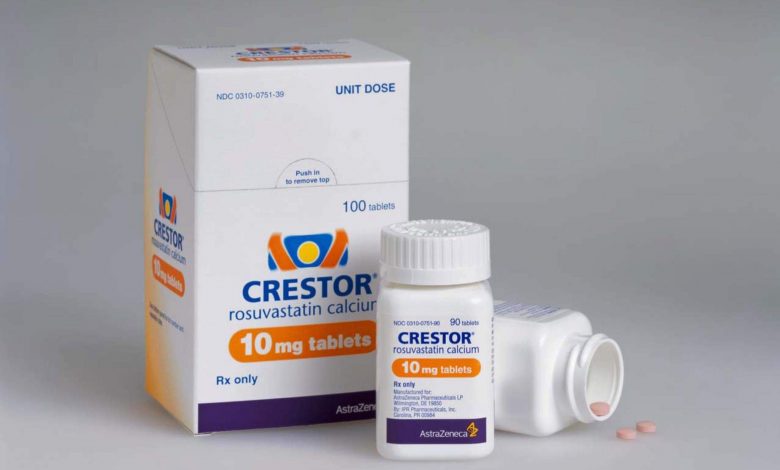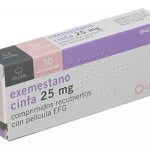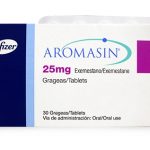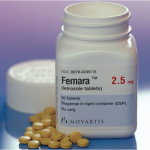Crestor (Rosuvastatin): Uses, Dosage, Side Effects, Interactions, FAQs

What is Crestor (Rosuvastatin)?
Crestor is a brand of rosuvastatin, a medication used together with diet, weight loss, and exercise to reduce the risk of heart attack and stroke and to decrease the chance that heart surgery will be needed in people who have heart disease or who are at risk of developing heart disease.
Rosuvastatin is also used to decrease the amount of cholesterol such as low-density lipoprotein (LDL) cholesterol (‘bad cholesterol’) and triglycerides in the blood and to increase the amount of high-density lipoprotein (HDL) cholesterol (‘good cholesterol’) in the blood. Rosuvastatin may also be used together with diet to decrease the amount of cholesterol and other fatty substances in the blood in children and teenagers 8 to 17 years of age who have familial heterozygous hypercholesterolemia (an inherited condition in which cholesterol cannot be removed from the body normally). Rosuvastatin is used together with diet, and alone or in combination with other medications, to decrease the amount of cholesterol and other fatty substances in the blood in adults, children, and teenagers 7 to 17 years of age who have familial homozygous hypercholesterolemia (an inherited condition in which cholesterol cannot be removed from the body normally).
How Crestor (Rosuvastatin) works
Rosuvastatin is in a class of medications called HMG-CoA reductase inhibitors (statins). It works by slowing the production of cholesterol in the body to decrease the amount of cholesterol that may build up on the walls of the arteries and block blood flow to the heart, brain, and other parts of the body.
Accumulation of cholesterol and fats along the walls of your arteries (a process known as atherosclerosis) decreases blood flow and, therefore, the oxygen supply to your heart, brain, and other parts of your body. Lowering your blood level of cholesterol and fats with rosuvastatin has been shown to prevent heart disease, angina (chest pain), strokes, and heart attacks.
How should this medicine be used?
Rosuvastatin comes as a tablet (Crestor) to take by mouth. Rosuvastatin also comes as a capsule (Ezallor) to take by mouth or to open, mix with water, and give through a feeding tube. It is usually taken once a day with or without food. Take rosuvastatin at around the same time every day. Follow the directions on your prescription label carefully, and ask your doctor or pharmacist to explain any part you do not understand. Take rosuvastatin exactly as directed. Do not take more or less of it or take it more often than prescribed by your doctor.
Your doctor will probably start you on a low dose of rosuvastatin and gradually increase your dose, not more than once every 2 to 4 weeks. Rosuvastatin (Crestor) is typically taken as 10 mg to 20 mg by mouth once daily. The dose may be adjusted depending on risk factors, family history, ethnicity, and side effects. The 40 mg dose of rosuvastatin (Crestor) is generally only used for people who do not meet their cholesterol goals on the 20 mg dose.
Swallow the capsules (Ezallor) whole; do not chew or crush them. If you cannot swallow the capsule, open the capsule and carefully sprinkle the contents onto 1 teaspoonful of applesauce. Swallow the entire mixture immediately without chewing. Do not save the applesauce mixture for later use.
Continue to take rosuvastatin even if you feel well. Do not stop taking rosuvastatin without talking to your doctor.
What are the Side Effects of Crestor (Rosuvastatin)?
As with most drugs, some people will have an adverse reaction to Crestor (Rosuvastatin). One study showed that 1.4 percent of patients stopped using it because of adverse reactions.
More than 2 percent of patients experienced:
- headache
- myalgia, or muscle pain
- abdominal pain
- nausea
- weakness or lack of energy
People who should not use Crestor (Rosuvastatin)include:
- those who are allergic to Crestor (Rosuvastatin)
- patients with liver disease
- pregnant or breastfeeding mothers
If a woman is taking Crestor (Rosuvastatin) and she becomes pregnant, she should inform her doctor at once, as there may be a risk to the fetus or the infant.
The following people should make sure their doctors know before being prescribed Crestor (Rosuvastatin):
- patients with kidney or liver disease
- people with diabetes
- patients with a thyroid disorder
- people who consume more than two alcoholic drinks each day
Patients should tell their doctor immediately if they experience:
- unexplained weakness, muscle pain, or tiredness
- loss of appetite
- upper abdominal pain
- dark urine
- jaundice
All these are signs and symptoms of rare but potentially serious side effects.
Patients taking Crestor (Rosuvastatin) have a very slight risk of developing rhabdomyolysis. This involves a breakdown of the skeletal muscles that release certain proteins, including myoglobin into the bloodstream.
Myoglobin can damage the kidneys and cause kidney failure.
Anybody who may be developing rhabdomyolysis should stop taking Crestor (Rosuvastatin) immediately.
What drugs may interact with Crestor (Rosuvastatin)?
Crestor (Rosuvastatin) oral tablet can interact with other medications, vitamins, or herbs you may be taking. An interaction is when a substance changes the way a drug works. This can be harmful or prevent the drug from working well.
To help avoid interactions, your doctor should manage all of your medications carefully. Be sure to tell your doctor about all medications, vitamins, or herbs you’re taking. To find out how this drug might interact with something else you’re taking, talk to your doctor or pharmacist.
Examples of drugs that can cause interactions with Crestor (Rosuvastatin) are listed below.
Acid-reducing drugs: When taken with Crestor (Rosuvastatin), certain antacids that contain aluminum or magnesium can decrease the amount of Crestor (Rosuvastatin) in your blood. This makes it less effective, and it won’t work as well to treat your condition. These drugs should be taken at least two hours after taking Crestor (Rosuvastatin). Examples of these drugs include:
• aluminum hydroxide
• magnesium hydroxide
Blood thinner: Warfarin is used to thin the blood. Taking this drug with Crestor (Rosuvastatin) can increase your INR. This is a measure of how quickly your blood clots. Your INR may need to be measured more often when you start taking Crestor (Rosuvastatin) or if your doctor changes your dosage.
Cholesterol drugs: When taken with Crestor (Rosuvastatin), some other drugs used to treat high cholesterol can increase the levels of Crestor (Rosuvastatin) in your blood. This raises your risk of muscle problems. Before taking these drugs, make sure your doctor knows that you take Crestor (Rosuvastatin). Examples of these drugs include:
• niacin
• gemfibrozil
• fenofibrate
HIV drugs: When taken with Crestor (Rosuvastatin), certain drugs used to treat HIV can increase levels of Crestor (Rosuvastatin) in your body. This raises your risk of side effects from Crestor (Rosuvastatin). These side effects include muscle problems such as muscle pain, weakness, or tenderness.
Examples of these drugs include protease inhibitors such as:
• atazanavir
• lopinavir
• nelfinavir
• ritonavir
Hepatitis C drugs: When taken with Crestor (Rosuvastatin), certain drugs used to treat hepatitis C can increase levels of Crestor (Rosuvastatin) in your body. This raises your risk of side effects from Crestor (Rosuvastatin). These side effects include muscle problems such as muscle pain, weakness, or tenderness.
Examples of these drugs include protease inhibitors such as:
• elbasvir/grazoprevir
Immune suppression drug: Cyclosporine is used to decrease the strength of the immune system. Using this drug with Crestor (Rosuvastatin) can increase levels of Crestor (Rosuvastatin) in your body. This raises your risk of side effects from Crestor (Rosuvastatin). These side effects include muscle problems such as muscle pain, weakness, or tenderness.
Gout drug: Colchicine is used to treat gout flares. Using this drug with Crestor (Rosuvastatin) can increase your risk of side effects such as muscle pain and rhabdomyolysis.
Cancer drugs: Darolutamide is used to treat prostate cancer. Using this drug with Crestor (Rosuvastatin) can increase the levels of Rosuvastatin in your body. This raises your risk of side effects from Crestor (Rosuvastatin). These side effects include muscle problems such as muscle pain, weakness, or tenderness.
Regorafenib is used to treat cancer of the colon and rectum. Using this drug with Crestor (Rosuvastatin) can increase the levels of Rosuvastatin in your body. This raises your risk of side effects from Rosuvastatin. These side effects include muscle problems such as muscle pain, weakness, or tenderness.
Frequently asked questions about Crestor (Rosuvastatin)
Do I have to take Crestor (Rosuvastatin) at bedtime?
Crestor (Rosuvastatin) may be taken at any time of the day. This is different from other statins that work best when they’re taken at night. This is because some statin medications do not stay in your body for very long (shorter half-life), and the body makes the most cholesterol at night.
Does Crestor (Rosuvastatin) make you gain weight?
No, weight gain is not a typical side effect with Crestor (Rosuvastatin).
Are Crestor (Rosuvastatin) and atorvastatin (Lipitor) the same?
Crestor (Rosuvastatin) and atorvastatin (Lipitor) are different medications, though both belong to the same class of medications known as statins. Both are strong statins that work to lower your cholesterol levels.
Does Crestor (Rosuvastatin) make it hard to fall asleep?
Some people have reported insomnia and nightmares with Crestor (Rosuvastatin), but these are not common side effects.
Can I drink alcohol while taking Crestor (Rosuvastatin)?
Drinking alcohol while taking Crestor (Rosuvastatin) can raise your risk of liver problems or serious side effects. Take care to avoid drinking a lot of alcohol while taking Crestor (Rosuvastatin).





